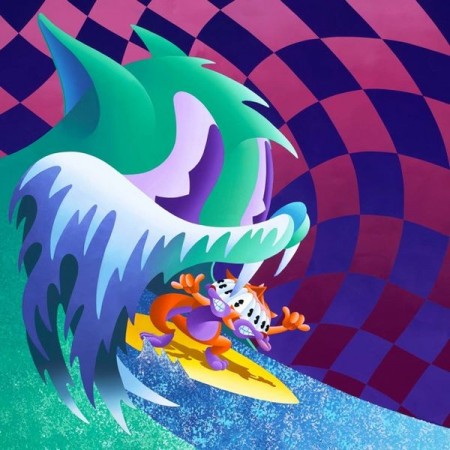So you spent many a drunken night in 2008 and 2009 shaking your booty on a sweaty dance floor in some trendy nightclub while DJs pummeled you senseless with the driving bass of the latest remix of MGMT’s “Kids” and “Time to Pretend”? Don’t lie. You know you did. And you loved it. And you weren’t alone. It seems like a lot of people did, and largely based on the strength and success of those two songs (even though “Electric Feel” is the best song on the record!) MGMT were catapulted into the limelight and became the “it” band of the indie music scene for the last couple of years. Or something like that. I mean how “indie” are they really? They’re under contract to SONY, one of the world’s largest entertainment conglomerates, if you didn’t know. Anyway, to give credit where credit is due, “Kids” is unquestionably a pop gem. Nevertheless, it’s also definitely earned itself a place among those songs that you love the first 8,000 or so times you hear them, but every time after a part of you kind of wishes that the people responsible for writing them would be shipped off to an undisclosed third world nation and forced to undergo a bit of water-boarding. Just a little. But I digress…
Oracular Spectacular as a whole was a successful endeavor. Blending danceable beats, a psychedelic esthetic and tight pop songwriting, the record managed to hit the indie zeitgeist, crossover into the mainstream, and sell over a million copies worldwide. No mean feat in this day and age of lagging album sales. Now for MGMT comes the hard part: avoiding the dreaded sophomore slump. So how does Congratulations, their new album which came out April 13 on Columbia Records fare?
Well, before delving into the record, let me say at the outset that it’s doubtful any of the tracks on Congratulations will become as ubiquitous as the hits from Oracular Spectacular. Eh… maybe “Brian Eno”, but not likely. There’s not a “Kids” or a “Time to Pretend” in the bunch, but, as the band has mentioned in interviews, they didn’t set out to create a collection of singles; rather, it was their explicit intent to create an album which they wanted to be considered as a single, cohesive body of work. This is a laudable goal and hearkens back to the spirit of bands like Pink Floyd, who, coincidentally, were recently involved in a lawsuit over preserving the integrity of their albums when being sold as digital downloads. It remains to be seen, however, how relevant such an approach, album over single, is these days, both from an artistic and a business standpoint.
From the late 60s to the 90s, and even for part of the early 00s, the album, whether on vinyl, CD, tape or 8-track, was the dominant form in which music was consumed. Over the last decade, however, MP3s and digital downloads have taken a significant bite out of the album format’s market share. Leaving aside the whole issue of illegal file trading, which is a can of worms I don’t particularly feel like opening at this moment, in our current age of personal empowerment, personalized playlists and the fragmentation of popular culture into in-numerous niche genres (post-industrial- afro-indie-goth-trance and what have you), a frequently raised argument, and not a new one by any means, is why consumers should purchase a whole album when all they want to listen to is one song? The best answer is to preserve the artist’s vision. But is that a valid reason?
When you get right down to it, pop music occupies a peculiar position in the cultural spectrum. Much like Hollywood films, pop music lies at the crossroads where commerce and art intersect. Let’s not kid ourselves: record companies are businesses, pop music is the product the record companies push, and we, the listeners and fans, are consumers of that product, whether we choose to pay for it or not. This is not to say that the music industry is completely devoid of earnest individuals who honestly believe in the artistic integrity of the musical productions in which they’re involved; it’s just an acknowledgment that at the end of the day the bills have to be paid. And for a long time the album format served the needs of both art and commerce. But this wasn’t always the case.
For the majority of the 50s and 60s, as far as pop music was concerned, the single–in the form of a 7 inch 45 rpm vinyl disc–was king. Elvis, Buddy Holly, Motown, the early Beatles, the Stones, the Who and the Kinks all reached the heights of fame and fortune riding the success of their single releases, most of which were in mono. Pop music was seen as a disposable commodity. Fans were expected to buy the hit single of the week in an inexpensive format and then the following week to buy whatever the next hit was. Until the mid-1960s albums were largely the preserve of “serious” music and featured the likes of jazz, classical recordings and the burgeoning genre of folk music, best represented by the likes of Bob Dylan. As the folk and pop music worlds began to converge in the heady, psychedelic soup that characterized contemporary rock n roll mid-decade and as rock-n-roll began to be taken, and to take itself, more seriously, the album became the preferred format of both artists and fans. And record companies didn’t mind either, since albums retailed for more money than singles. The advent of the CD only served to reinforce this trend and by the mid-90s the single, as a viable commercial format in US record stores, was well on its way to extinction (12 inch singles for DJs and the market in the UK were beasts of a different sort, however).
Personally, I love the album format; it’s my preferred way to listen to music, whether I’m driving in the car, cleaning the house or writing poorly thought out and never-getting-to-the-point record reviews. A 35-45 minute musical statement by an artist is just about the perfect size. Come to think of it, there’s another strike against the CD format: album bloat. Before the advent of the CD, most albums, because of the technical limitations of the vinyl format, clocked in at around 45 minutes and were thus limited to around 10-12 songs (3 if it was a Yes album). CDs allowed single albums to stretch out at first to 74 minutes and eventually to 80 minutes. This is longer than most double albums on vinyl. And let’s remember that double albums, aside from live records, were pretty rare. The White Album, Electric Ladyland, Tommy, Layla, Exile on Mainstreet, Quadrophenia, Physical Grafitti, London Calling, the Wall… all classics. More than half of the records on that list, however, fit onto a single CD these days, with, at most, a couple of minutes of excess running time preventing all of the other from fitting except for The White Album which clocks in at just over 90 minutes. This only reinforces the point of how unnecessarily long projects like Mellon Collie and the Infinite Sadness, Stadium Arcadium, both running in excess of two hours in length, and, well, all of Metallica’s output since the self-titled Black Album really are. And it’s not like listeners are getting more bang for their buck from these bloated behemoths; they’re just getting more of that dreaded f word: filler. I mean, how does a listener even go about absorbing a 28 song, two hour long album? I might be biased (Who? Me?), but we’ll let George Harrison slide for All Things Must Pass, since he was champing at the bit to release that huge backlog of songs he had written while he was in a funny little band you might have heard of with two other heavy duty songwriters. But seriously, when was the last time you sat through the Clash’s Sandinista from beginning to end? And how stoned were you when you did?
In the end, however, the supremacy of the album proved to be a transient phenomenon, laid low by the triumph of the iPod and digital downloads. In a way, then, we’ve come full circle. The single is back as the dominant format in which pop music is consumed… but we don’t even get a b-side these days. Look, I’m pretty happy that I’m able to download, say, Looking Glass’s “Brandy (You’re a Fine Girl)” and a-ha’s “Take On Me”, throw them on my iPod and listen to them whenever I want (which is more often than you’d think) without having to buy a whole album worth of stuff I don’t particularly have any desire to listen to. Clearly, I’m not alone in this. Still, there’s nothing like a good album start to finish.
So, then, in eschewing singles and taking a stand in favor of albums, are MGMT tilting at windmills? Perhaps. But fuck it. Good for them.
Oftentimes you’ll see reviewers throw around the word “challenging” when talking about a record that departs from a band’s established sound. And that’s a term that’s sure to find its way into a lot of reviews of Congratulations. Usually the use of the word “challenging” is a euphemism; it’s code and the real meaning is that the reviewer thinks the record sucks big hairy moose cock but, for whatever reason, can’t or won’t come out and say it. I wouldn’t exactly say that Congratulations is a challenging record, as the tracks included are all very accessible to the listener in their own ways. Nevertheless, the nine tracks on Congratulations are sure to elicit from people who only know about MGMT from having heard “Kids” and “Time to Pretend” many boldfaced, italicized and underlined WTF?!?!?!?!?!?!?!?!s. This ain’t necessarily your parents, er, 2008’s MGMT. But in a way it still is.
If you happened to make it past track 5 of Oracular Spectacular and listened to trippier tracks like “Pieces of What” and “The Handshake,” the sound of Congratulations will come as much less of a shock to you. The dance floor beats are largely absent (someone’s gotta be doing dance remixes of the tracks though, no?) and the trippier psychedelic aspects of the band are on full display. Overall, then, the album has a fairly cohesive sound. Track after track features a lush sound-scape with interesting arrangements and a good heaping dose of reverb. So on the level of producing an album that holds together as a unified musical work Congratulations certainly succeeds in fulfilling the vision of its creators. But are the songs any good?
The first taste listeners had of Congratulations came from the release of the album’s lead teaser “Flash Delirium” (it’s not a single!) and its zany video. The track is a bit of a curve-ball in the sense that in terms of its frenetic pace and spastic stylistic shifts the song is unlike anything on Oracular Spectacular. No doubt about it, just like its video, “Flash Delirium” is a weird fucking song. It’s as if the band decided to include some aspect from everything that influenced this record on this one track and do it in the space of just over four minutes. Still, the hooks come at you in rapid fire succession and the rave-up ending proves to be a highlight of the record.
The album itself opens up with the distinctly 60s-sounding surf-rock psychedelia of “It’s Working” which really sets the stage for the rest of the record. I can’t tell whether the band dug up some old Strawberry Alarm Clock, Procul Harem and Vanilla Fudge records or if they’ve just been listening to the Flaming Lips too much, but whatever they’re doing, this song and the rest of the album are steeped in a kaleidoscopic psychedelic vibe. The effects on the vocals on “It’s Working” are even suggestive of the sound of Jim Morrison’s vocals on “Strange Days.” Also, considering the stylistic departure from Oracular Spectacular you can’t help but appreciate the tongue-in-cheekishness of ending the first verse with the line “how will I know if it’s working right?” An admission that the band is out on a limb, perhaps? Or just fodder for cynical reviewers like me? Hmmmmm. The 60s vibe of “It’s Working” continues on the next track, “Song For Dan Treacy” with its Roger McGuinn approved chiming guitars and carnivalesque organ parts and on “Someone’s Missing” where the band initially mellows out before exploding into an anthemic chorus.
“Flash Delirium” is next and is followed in turn by “I Found a Whistle” which is one of the gems on the record. It’s a great little pop song with a strong melody and an ambitious arrangement complete with Beach Boys-style Theremin licks that hearken back to the carefree sounds of summer times past.
The 12 minute epic “Siberian Breaks” is the centerpiece of the album taking listeners on a roller-coaster ride through incense and peppermint landscapes (Did I really just write that? Did someone spike the punchbowl?). In its length and diversity the track recalls classic epics like Pink Floyd’s “Atom Heart Mother” suite and Neil Young’s “Broken Arrow”. It starts off with a dreamy sound-scape with tight harmony vocals that wouldn’t feel out of place on a Wilco record, and then moves through a waltz-like second movement and an electro-inspired breakdown, returns to the main theme and then to a heavy bridge with big distorted guitars. It’s an ambitious move by the band, and the true measure of the song’s success is that it manages to maintain the listener’s attention despite its length. Each new movement and recapitulation of the main thematic element is accompanied by the introduction of new sounds and new instruments in the arrangement. Which render the song a true tour de force.
On “Brian Eno” the band returns to the poppy psychedelia of the beginning of the album and produce a track with what are probably the strongest hooks on the record. In keeping with the abrupt stylistic shifts characteristic of the album, however, the track also features a jazzy breakdown before exploding back into the sing along chorus.
The instrumental “Lady Dada’s Nightmare” follows and is appropriately enough filled with Roger Waters-like nightmarish screams as the songs dirge-like progression repeats over and over. Finally, the album closes with the title track “Congratulations”, a fitting response to the album opener’s question of “how will I know if it’s working right?” Based on the choice of title for the album it would appear that the band thinks the album does work, and I’m inclined to agree. Here’s to the band, then, to paraphrase frontman Andrew VanWyngarden’s lyrics on the closer, spreading their arms and soaking up congratulations for a job well done.
In all, Congratulations, as an album, is an eclectic mix, but is it going to be a hit? That’s a difficult question to answer. What exactly constitutes a “hit” in the indie world these days, anyway? Anything above a 6 on Pitchfork? I’ll admit, the album may prove challenging in some quarters, specifically SONY’s marketing department, who are going to have one hell of a time trying to figure out how to push this record. Well, here’s my cheeky suggestion: with its genre defying stylistic variety and ambitious arrangements, Congratulations at times almost borders on being a prog-rock record. The only things missing are extended wankfest guitar, keyboard and drum solos, which suggests that what we’re dealing with here is a case of addition by subtraction. The band members deserve to pat themselves on the back for taking a risk in turning their backs on the easy way out and placing a higher value on the creation of art over the creation of a commodity. While the album may not set the sales charts alight and become the megahit that Oracular Spectacular was, as it stands right now I doubt that any other high profile release this year will top Congratulations in terms of the impact it has as an artistic statement.
Nick Fokas








